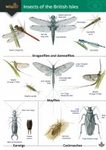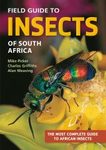About this book
Revised edition of 'Comprehensive Insect Physiology, Biochemistry and Pharmacology', published in 1985 as a 13 volume set by Pergamon Press. The new edition covers new technologies that have been developed since 1985. The index volume will help researchers to track specific subjects and particular species of insects cited in several volumes. The electronic version of this reference work will be reviewed and updated on an ongoing basis, concentrating on those subjects where significant advances have occurred to ensure content remains up-to-date.
From the publisher's announcement:
The important developments and achievements in modern insect science since the first edition have led to this new revised, expanded and retitled reference work. New chapters in this edition include the ecdysone receptor, lipocalins, bacterial toxins, etc. Each article may also be read independently, as a review of that particular subject.
Comprehensive Molecular Insect Science also covers new technologies that have been developed since 1985. The Index Volume will help researchers to track specific subjects and particular species of insects cited in several volumes.
Key Features:
Revised edition of critically acclaimed Comprehensive Insect Physiology, Biochemistry and Pharmacology (1985, Pergamon Press, 13 Volume Set)
Written by a distinguished international group of contributors
Well-organized format provides for concise, readable entries, easy searches, and thorough cross-references
Complete up-to-date coverage of many important topics - essential information for scientists, students, and professionals alike!
Available Online in 2005 via ScienceDirect!
Extensive browse and search across subject, thematic, alphabetical, author and cited author indexes - as applicable to the work
Basic and advanced search functionality within volumes, parts of volumes, or across the whole work
Build, save and re-run searches as well as combine saved searches
Internal cross-referencing between articles in the work, plus dynamic linking to journal articles and abstract databases, making navigation flexible and easy
All articles are available as full text HTML files, and as PDF files that can be viewed, downloaded or printed out in their original print format
The online edition of this title is kept under regular editorial review, and enhanced as warranted to reflect the state of current knowledge. Enhancements may take place as frequently as annually and may consist of new versions of existing articles, new articles, or additional material.
Contents
Includes: Molecular Genetics of Insect Fertilization; Sex Determination and the Development of the Genital Disc; Dosage Compensation; Fat-Cell Development; The Juvenile Hormones; Biochemistry and Molecular Biology of Pheromone Production; Biochemistry of Digestion; Insect Transposable Elements; Amino Acid and Neurotransmitter Transporters; Insect Growth-and Development-Disrupting Insecticides; Azadirachtin, a Natural Product in Insect Control; Genetically Modified Baculoviruses for Pest Insect Control; Pheromones - Function and Use in Insect Control; Scorpion Venoms; Insect Transformation for Use in Control; Spider Toxins and their Potential for Insect Control
Customer Reviews
Biography
Kostas Iatrou is the Director of the "Insect Molecular Genetics and Biotechnology" Research Group at the Institute of Biology, NCSR "Demokritos" and an adjunct Professor of the University of Calgary. He is the former Professor of Biochemistry and Molecular Biology at the Faculty of Medicine, University of Calgary, Canada and Director of the Institute of Biology, National Institute of Scientific Research "Demokritos", Athens Greece. His major research interests are in the areas of insect cell differentiation, development and reproduction. His parallel research activities include the development of insect, insect cell and insect virus-based functional genomics tools and technologies that can be used for a wide variety of biotechnological applications impacting on the fields of insect pest control human disease treatment. Sarjeet S. Gill is Professor of Cell Biology in the Department of Cell Biology and Neuroscience at the University of California, Riverside, and Entomologist in the Agricultural Experimental Station on the same campus. His research interests are in biochemistry, molecular biology and insect toxicology, with a focus on mechanisms of bacterial and viral pathogenesis, and the role of the midgut and Malpighian tubules in insect homeostasis. Dr. Gill's research also employs the use of whole genome tools to analyze gene function. His research has been continually funded through the NIH and USDA, he continues to serve on national and international committees related to his research interests, and is an elected fellow of the American Association for the Advancement of Science. Lawrence I. Gilbert is William Rand Kenan jr. Professor of Biology at the University of North Carolina at Chapel Hill. He has served on many national and international committees in the areas of insect biochemistry, physiology and more recently, molecular biology. Dr. Gilbert has been the author or coauthor of about 300 research publications and books and has received many awards for his professional work. These include the Lifetime Mentor Award of the American Assn. for the Advancement of Science, the Gregor Mendel Award from the Czech Academy of Sciences, the Jefferson Award (highest award given by the University of North Carolina, and is an elected fellow of the American Academy for Arts and Sciences, the Entomological Society of America and the AAAS. During his career he has mentored 34 doctoral students and 55 post-doctoral associates and visiting scholars. His research has been continually supported by grants from NIH and/or NSF.



































